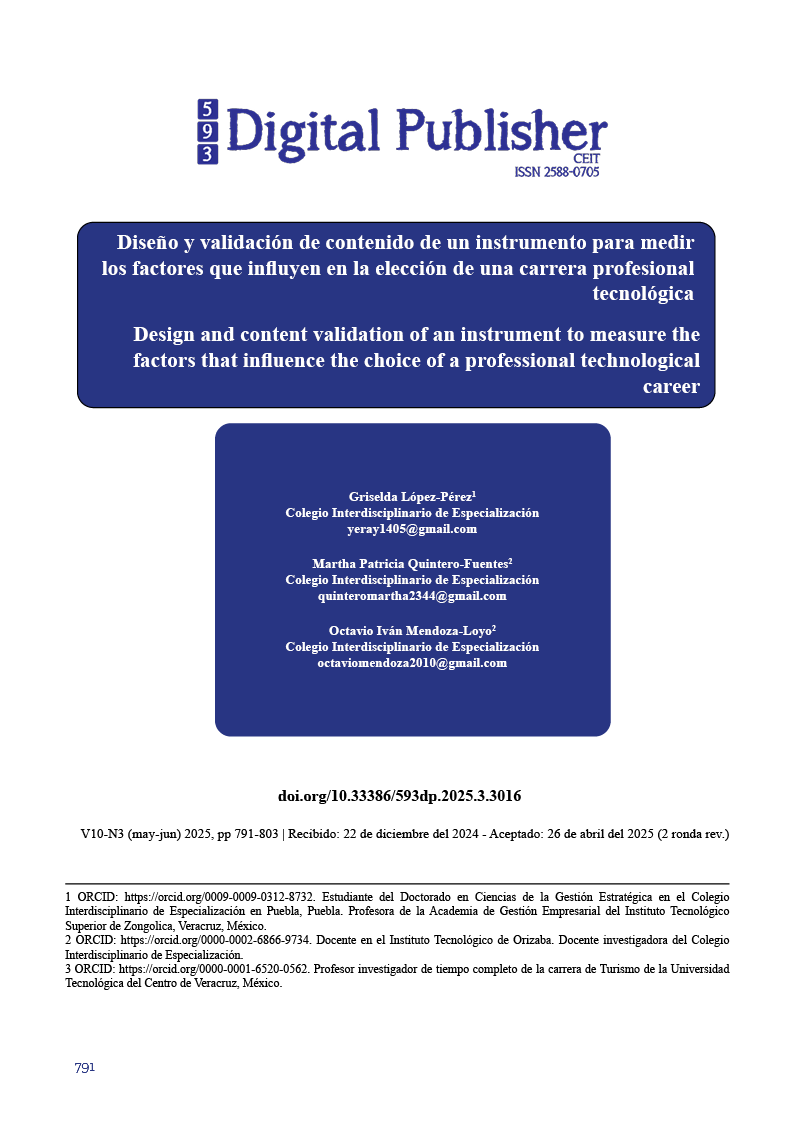Design and content validation of an instrument to measure the factors that influence the choice of a professional technological career
Main Article Content
Abstract
The choice of a university career is a complex process influenced by various factors that vary according to each individual and his or her environment. The objective of this research is the content validation of an instrument that measures the factors that influence the choice of a technological career. Method: Descriptive, psychometric study of content validity by means of expert judgment. The participants were a group of seven experts in technological higher education. An instrument with four dimensions and 20 items was designed to measure the factors that influence the choice of a professional career: social environment, educational quality, context of the institution and exogenous factors. The Fleiss Kappa statistic was used to evaluate the concordance among the judges. Results: with Kappa coefficients of 0.746 (coherence), 0.768 (relevance) and 0.699 (clarity) with a concordance strength of considerable for the three criteria. Conclusion: with the validity of this instrument by means of expert judgment, it was possible to evaluate the factors that influence the choice of professional career for a technological higher education institution: social environment, educational quality, context of the institution and exogenous factors; highlighting considerable levels for the criteria considered..
Downloads
Article Details

This work is licensed under a Creative Commons Attribution-NonCommercial-ShareAlike 4.0 International License.
1. Derechos de autor
Las obras que se publican en 593 Digital Publisher CEIT están sujetas a los siguientes términos:
1.1. 593 Digital Publisher CEIT, conserva los derechos patrimoniales (copyright) de las obras publicadas, favorece y permite la reutilización de las mismas bajo la licencia Licencia Creative Commons 4.0 de Reconocimiento-NoComercial-CompartirIgual 4.0, por lo cual se pueden copiar, usar, difundir, transmitir y exponer públicamente, siempre que:
1.1.a. Se cite la autoría y fuente original de su publicación (revista, editorial, URL).
1.1.b. No se usen para fines comerciales u onerosos.
1.1.c. Se mencione la existencia y especificaciones de esta licencia de uso.
References
Bravo, G., Vergara, M. (2018). Factores que determinan la elección de carrera profesional: en estudiantes de undécimo grado de colegios públicos y privados de Barrancabermeja. Revista Psicoespacios, Vol. 12, N. 20, pp.35-48. https://doi.org/10.25057/issn.2145-2776
Chávez, S. C., Reyes, F. H., & Gutiérrez, M. E. P. (2021). Factores que inciden en la elección de una carrera universitaria. PsicoEducativa: reflexiones y propuestas, 7(13), 15-24.
DeVellis, R. F., & Thorpe, C. T. (2021). Scale development: Theory and applications (5th ed.). SAGE Publications.
Escobar-Pérez, J., & Cuervo-Martínez, Á. (2008). Validez de contenido y juicio de expertos: una aproximación a su utilización. Avances en medición, 6(1), 27-36.
Escobar, V. G. D., Sigüenza, J. o. T., Perdido, M. U. G., & Martínez, C. S. T. (2021). Factores que inciden en la elección de carreras STEM en la educación universitaria de El Salvador. Anuario de Investigación Universidad Católica de el Salvador, 10, 23-38. https://doi.org/10.5377/aiunicaes.v10i1.12487
Espinoza Salfate, L., Guerrero, G., Barbé Farré, J., & Márquez Salinas, F. (2023). Design and Validation of a Classroom Observation Instrument to Evaluate the Quality of Mathematical Activity from a Gender Perspective. Education Sciences, 13(3), 266. https://doi.org/10.3390/educsci13030266
Fernández-Gómez, E., Martín-Salvador, A., Luque-Vara, T., Sánchez-Ojeda, M. A., Navarro-Prado, S., & Enrique-Mirón, C. (2020). Content Validation through Expert Judgement of an Instrument on the Nutritional Knowledge, Beliefs, and Habits of Pregnant Women. Nutrients, 12(4), 1136. https://doi.org/10.3390/nu12041136
Fleiss, J. L. (1971). Measuring nominal scale agreement among many raters. Psychological Bulletin, 76(5), 378–382. https://doi.org/10.1037/h0031619
Galicia Alarcón, Liliana Aidé; Balderrama Trápaga, Jorge Arturo y Edel Navarro, Rubén. (2017). Validez de contenido por juicio de expertos: propuesta de una herramienta virtual. Apertura, 9 (2), pp. 42-53. http://dx.doi.org/10.32870/Ap.v9n2.993
García Perales, R. (2018). Diseño y construcción de un instrumento de evaluación de la competencia matemática: aplicabilidad práctica de un juicio de expertos. Ensaio: Avaliação e Políticas Públicas em Educação, 26(98), 345–370. https://doi.org/10.1590/S0104-40362018002601263
García M. R., Poblano O, E. R, & García G. L. (2024). Factores determínantes en la elección de una carrera universitaria. Investigación administrativa, 53(133), 00002. Epub 20 de mayo de 2024. https://doi.org/10.35426/iav53n133.02
Gómez, J. (2023). Factores que Influyen en la Elección de la Carrera Universitaria en Estudiantes de Educación Media Superior. Sapiencia Revista científica y académica, 3(2), 161–181. https://doi.org/10.61598/s.r.c.a.v3i2.60
Hall, M., & Langford, P. (2008). Factors Affecting the Choice of University among South African Students. South African Journal of Higher Education, 22(1), 144–161.
Landis, J. R., & Koch, G. G. (1977). The measurement of observer agreement for categorical data. Biometrics, 33(1), 159–174. https://doi.org/10.2307/2529310
Lent, R. W., Sheu, H.-B., Singley, D., Schmidt, J., Schmidt, L. C., & Gloster, C. S. (2008). Longitudinal relations of self-efficacy to outcome expectations, interests, and major choice goals in engineering students. Journal of Vocational Behavior, 73(3), 328–335. https://doi.org/10.1016/j.jvb.2008.07.005
Matos, F. R., Rossini, J. C., Lopes, R. F. F., & Amaral, J. D. H. F. D. (2020). Translation, adaptation, and evidence of content validity of the Schema Mode Inventory. Psicologia - Teoria E Prática, 22(2). https://doi.org/10.5935/1980-6906/psicologia.v22n2p39-59
McHugh, M. L. (2012). Interrater reliability: the kappa statistic. Biochemia Medica, 22(3), 276-282.
National Science Foundation. (2020). Women, minorities, and persons with disabilities in science and engineering: 2020. https://ncses.nsf.gov/pubs/nsf21321/
Palacios, Y. (2021). Factores que intervienen para elegir carreras universitarias. Universidad Técnica de Manabí. Trends and challenges in Higher Education in Latin America, 200.
Rodríguez-Muñiz, L. J., Areces, D., Suárez-Álvarez, J., Cueli, M., & Muñiz, J. (2019). ¿Qué motivos tienen los estudiantes de Bachillerato para elegir una carrera universitaria? Revista de Psicología y Educación, 14, 1–15. https://doi.org/10.23923/rpye2019.01.167
Rodríguez, K. C. A., & Medina, D. E. M. (2018). Elección de carreras universitarias en áreas de ciencia, tecnología, ingeniería y matemáticas (STEM): revisión de la literatura. Revista Interamericana de Educación de Adultos, 40(2), 154-173. https://www.redalyc.org/comocitar.oa?id=457556293008
Rodríguez A. M., Baas M. A., Cachón C. M. (2017). Factores que influyen en los alumnos para la elección de carrera de escuelas normales públicas. Congreso Nacional de Investigación Educativa. Comie. San Luís Potosí, México. https://www.comie.org.mx/congreso/memoriaelectronica/v14/doc/2500.pdf
Salazar, E. and Vidal, D. (2021). Mujeres que eligen ciencias: autoeficacia, expectativas de resultado, barreras y apoyos percibidos para la elección de carrera universitaria. Calidad en La Educación, (54), 271-302. https://doi.org/10.31619/caledu.n54.994
Soto, G. M., & Benson, L. (2019). Factores que pueden influenciar la selección de una ingeniería como carrera dependiendo de las habilidades matemáticas de los estudiantes / Factors that influence students’ decisions to pursue engineering as a major for students with different mathematics abilities. RIDE Revista Iberoamericana Para la Investigación y el Desarrollo Educativo, 9(18), 654-682. https://doi.org/10.23913/ride.v9i18.440
Sotomayor-Llamas, A. (2023). Determinantes en la Elección de Carreras Universitarias por Estudiantes: Una revisión sobre los Factores que Inciden en la Toma de Decisiones Vocacionales. Revista Científica Anfibios, 6(1), 104-111. https://doi.org/10.37979/afb.2023v6n1.131467.
Valero A. V. N., & Condori C. W. W. (2023). Factores que influyen en la elección de las carreras de educación en la universidad. Editorial Idicap Pacífico, 22–36. https://doi.org/10.53595/eip.010.2023.ch.2
Viera, A. J., & Garrett, J. M. (2005). Understanding interobserver agreement: The kappa statistic. Family Medicine, 37(5), 360–36
Wang, M.-T., & Degol, J. L. (2017). Gender gap in science, technology, engineering, and mathematics (STEM): Current knowledge, implications for practice, policy, and future directions. Educational Psychology Review, 29(1), 119–140. https://doi.org/10.1007/s10648-015-9355-x
Zamanzadeh V, Rassouli M, Abbaszadeh A, Alavi Majd H, Nikanfar A, Ghahramanian A. Details of content validity and objectifying it in instrument development. Nursing Practice Today, 1(3):163-171. https://npt.tums.ac.ir/index.php/npt/article/view/24
Zamanzadeh, V., Ghahramanian, A., Rassouli, M., Abbaszadeh, A., Alavi-Majd, H., & Nikanfar, A. R. (2015a). Design and implementation content validity study: Development of an instrument for measuring patient-centered communication. Journal of Caring Sciencies, 4(2), 165-178.
Zayed, N., & Tumpa, S. R. (2016). Factors affecting career decision in study and work life in Bangladesh. Daffodil International University Journal of Business and Economics, 10, (2), 147-159.




